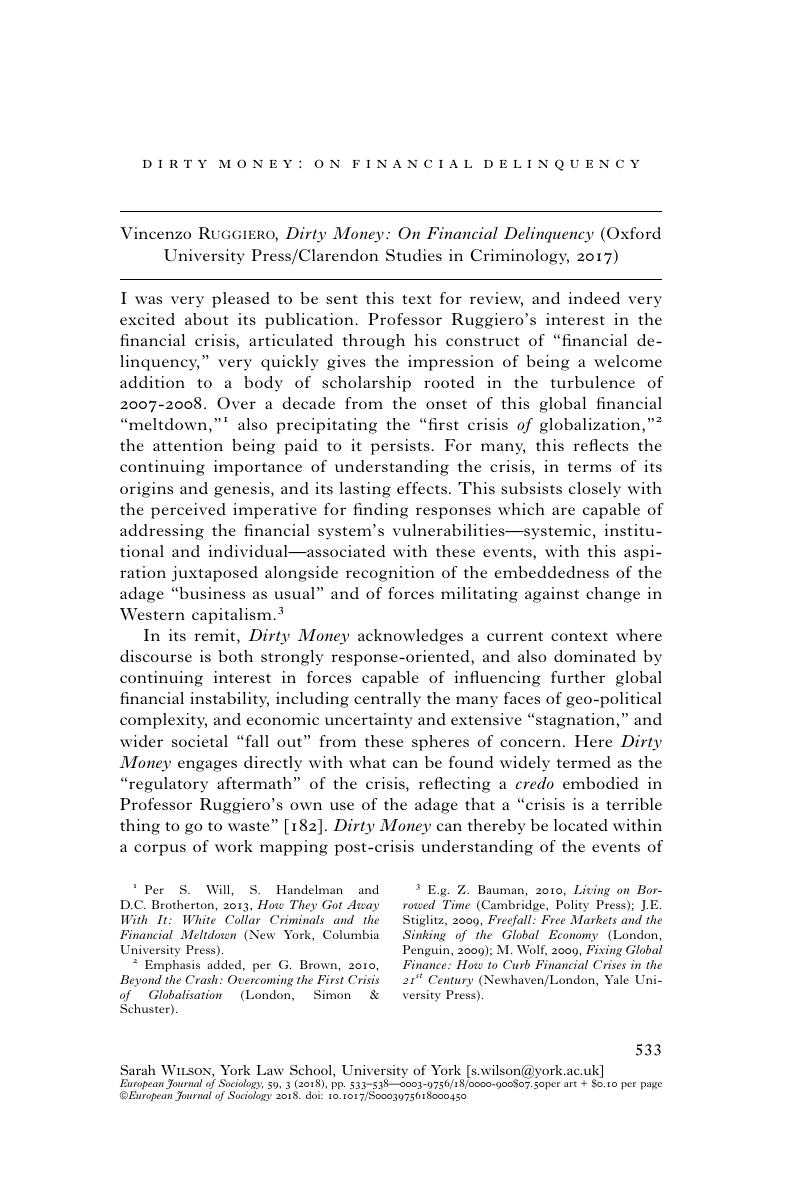No CrossRef data available.
Published online by Cambridge University Press: 31 January 2019

1 Per S. Will, S. Handelman and D.C. Brotherton, 2013, How They Got Away With It: White Collar Criminals and the Financial Meltdown (New York, Columbia University Press).
2 Emphasis added, per G. Brown, 2010, Beyond the Crash: Overcoming the First Crisis of Globalisation (London, Simon & Schuster).
3 E.g. Z. Bauman, 2010, Living on Borrowed Time (Cambridge, Polity Press); J.E. Stiglitz, 2009, Freefall: Free Markets and the Sinking of the Global Economy (London, Penguin, 2009); M. Wolf, 2009, Fixing Global Finance: How to Curb Financial Crises in the 21 st Century (Newhaven/London, Yale University Press).
4 E.g. J.W. Williams, 2012, Policing the Markets: Inside the Black Box of Securities Enforcement (Abingdon, Routledge).
5 D.O. Friedrichs, “Wall Street: Crime Never Sleeps,” in S. Will, S. Handelman and D.C. Brotherton, How They Got Away With It: White Collar Criminals and the Financial Meltdown (New York, Columbia University Press: 3-25); J. Welby, 2012, “Repair or Replace: Where do we Start among the Ruins?” Lecture for Finanzethikon (Zurich, 26 October 2012); G. Wilson and S. Wilson, 2013, “The pursuit of ‘socially useful banking’ in twenty-first century Britain and exploring Victorian interactions between law, religion and financial marketplace values,” Nottingham Law Journal, 22: 53-75.
6 Friedrichs 2013, cf. supra; and R. Tomasic, 2011, “The financial crisis and the haphazard pursuit of financial crime,” Journal of Financial Crime, 18(1): 7-31.
7 Welby 2012, cf. supra.
8 E.g. R.H. Tawney, 2015 [1926], Religion and the Rise of Capitalism (London, Verso Books); and B. Hilton, 1997 [1989], Age of Atonement: The Influence of Evangelicalism on Social and Economic Thought, 1785-1865 (Oxford, Oxford University Press).
9 E.g C.M. Reinhart and K.S. Rogoff, 2009, This Time Is Different: Eight Centuries of Financial Folly (Princeton, Princeton University Press); W. Scheidel, 2017, The Great Leveler: Violence and the History of Inequality from the Stone Age to the Twenty-First Century (Princeton, Princeton University Press).
10 E.g. A. Haldane, “Credit is Trust” (Leeds, Association of Corporate Treasurers speech, 14 Sept. 2009); M. King, The Today Lecture 2012 (London, BBC Radio 4, 2 May 2012); P. Tucker, 2009, “Regimes for handling bank failures: redrawing the banking social contract,” Restoring Confidence – Moving Forward (London, the British Bankers’ Association Annual International Banking Conference, 30 June 2009).
11 E.g. J. Tosh, [1984] 2015, The Pursuit of History: Aims, Methods and New Directions in the Study of History (London/New York, Routledge).